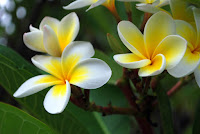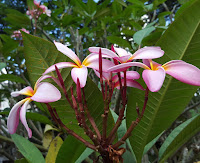After running in place for several weeks just to keep from falling behind, I've finally gotten around to doing the drawing for the perfume and cosmetics samples.
The winner is: MARY.
Please contact me by e-mail at olympicorchids at gmail dot com or leave a PM on our Facebook page. If the winnings are not claimed they will go into the jackpot for next time.
Even after packing a big box of cosmetic samples, there's still enough for another drawing of the same, plus the usual 100 g of samples.
To enter the new drawing, just leave a comment about what you're looking forward to this spring. I know I'm looking forward to spring break!
[The webcam photo from the local ski area in the rain looks like the invasion of the alien bubbles]
Wednesday, February 14, 2018
Friday, February 2, 2018
FRANGIPANI ABSOLUTE
Given so many distractions, my plan to post giveaways on Mondays and post about materials on Wednesdays has gone awry. Maybe the bright side of this is that I've co-opted my usual Friday complaint about something.
Frangipani, also called plumeria, is a type of shrubby tree
native to Central America, Polynesia, and parts of South America. It has been
introduced to tropical regions all over the world as an ornamental tree. The
white flowers are, as would be expected, fragrant at night to attract
night-flying pollinators. There are plenty of cultivars that have been bred to
have flowers in shades of lavender, yellow, pink, and red. The fragrance of
fresh flowers is quintessentially tropical, somewhat like jasmine, gardenia,
and other white flowers, but with a character of its own.
The scent of the absolute is not at all like the fragrance
of the fresh flowers. I’ve tried frangipani absolute from several sources, and
all are similar. The absolute itself is waxy and difficult to work with. It doesn’t
really liquefy when heated, as most other absolutes do. It doesn’t readily
dissolve in alcohol. The scent is mild, crisp-green like mastic, honeyed-sweet, and cooked-vegetal. For the first few minutes, it has a sharp, almost menthol-like note and
a hint of what is commonly called “indolic” in perfume descriptions, but that I
would call more “cresolic”. After that it’s mostly green and slightly
honey-sweet, like baked acorn squash with brown sugar, becoming less aromatic
and more of a waxy-woody dried hay smell as it declines and fades away.
Longevity is in the top-note range given that it only lasts about an hour. I
think anyone used to commercial perfumes (or just smelling fresh frangipani
flowers) might be disappointed by the absolute.
Given that real frangipani absolute is horrendously
expensive and not the most tractable material to work with, is it worth using
in a perfume? I did use it in Tropic of Capricorn, and I think it contributes
to the overall jungle-y-wet feeling; it may also modify some of the other
materials. For that reason, I need to keep a supply on hand, but I’m not sure
I’d commit to using it again.
Unless a fragrance is credibly guaranteed all-natural, any mention of
a frangipani (or plumeria) note refers to a synthetic accord, not the absolute.
The synthetics are strong and floral-smelling, with considerable longevity,
what most people would associate with frangipani or tropical flowers in general.
Have you ever smelled frangipani absolute? If so, what did
you think of it? If not, do you have any favorite perfumes with
frangipani/plumeria notes?
[Photos all from Wikimedia]
Subscribe to:
Posts (Atom)








